Ancient Villages
Ancient Villages in Yunnan
Baiyi Village (摆依村) is located in Jiagu Village Committee (贾姑村委会), Shijie Yi Ethnic Township (十街彝族乡), Yimen County (易门县), Yuxi City (玉溪市), Yunnan Province (云南省). It is 32 kilometers from Yimen County seat and 52 kilometers from Eshan County (峨山县), conveniently situated near the Yimen–Eshan Highway (易峨高公路).
Baiyi Village (摆依村) is a typical Yi ethnic village with a history of several centuries. It was once home to a Dai (傣族) community before the Dai migrated and Yi people moved in, keeping the original name “Baiyi.” Historically, it served as a beautiful mountain village along the ancient Yimen–Eshan post road. In November 2017, Baiyi Village was honored as one of the Fifth National Civilized Villages and Towns. It has also been recognized as a National Ethnic Minority Characteristic Village, a Provincial Ethnic Tourism Village, and a Municipal Model Village for Ethnic Unity and Progress.
Baiyi Village preserves rich Yi ethnic traditions. The village features a Yi Folk Culture Museum, transformed from traditional Yi residences. Inside, visitors will find hearths, stone mills, water jars, looms, and farming tools—each object tells a story of rural life and local heritage. During the Torch Festival (火把节), visitors can enjoy traditional Yi songs and dances, experiencing the vibrant and hospitable Yi culture.
Baiyi Village lies in a subtropical plateau monsoon climate zone, with mild winters and warm weather year-round. Spring is dry while summer is wet, with rain and heat coinciding. The best time to visit is in spring and autumn, when the climate is most pleasant and the scenery at its peak.
Yi Folk Culture Museum: Learn about Yi customs and culture.
Suggested visit duration: 1 hour
Ancient Tree Landscape: The village is shaded by centuries-old trees and flowing springs, offering a serene and traditional atmosphere.
Suggested visit duration: 1 hour
Surrounding Natural Scenery: Baiyi Village is nestled among lush hills and flowing streams, with idyllic countryside views.
Suggested visit duration: 2–3 hours
Public Transportation: Take a public bus within Yuxi City (玉溪市) to reach Yimen County (易门县), then transfer to local transport to Baiyi Village (摆依村), Shijie Township (十街乡).
Self-driving: Departing from Yuxi City, follow the Yimen–Eshan Highway (易峨高公路) to Baiyi Village, approximately 32 kilometers in total.
The village and surrounding areas offer authentic Yi ethnic cuisine, including roasted whole lamb, hand-grabbed meat, and chili chicken (蘸水鸡).
Baiyi Village offers various local agricultural products and handmade crafts. Visitors can purchase unique souvenirs and specialties.
Local Farmstays: Provide lodging services and an immersive experience of rural Yi family life.
Nearby Hotels: Hotels in Yimen County (易门县) are conveniently located and easily accessible from Baiyi Village.
Environmental Protection: Please protect the natural environment and avoid littering during your visit.
Cultural Respect: When participating in cultural activities, respect local customs and traditions.
Day 1:
Morning – Arrive in Baiyi Village and visit the Yi Folk Culture Museum to learn about Yi culture.
Noon – Enjoy local specialty cuisine.
Afternoon – Walk through the ancient tree landscape and appreciate the blend of nature and culture.
Evening – Stay overnight at a local farmstay.
Day 2:
Morning – Explore the surrounding natural scenery with opportunities for hiking and photography.
Noon – Lunch at the farmstay.
Afternoon – Return to Yimen County or Yuxi City to conclude your trip.
Baiyi Village (摆依村) draws visitors with its stunning natural scenery and rich Yi cultural heritage. Whether wandering through ancient lanes or participating in ethnic festivities, you’ll be enchanted by the village’s charm. May your journey to Baiyi be unforgettable.
Pingtanzi Village (平滩子村) is located in Zhongtun Community (中屯社区), Longquan Subdistrict (龙泉街道), Yimen County (易门县), Yuxi City (玉溪市), Yunnan Province (云南省). It is situated 32 kilometers from the county seat of Yimen. The village belongs to Zhongtun Community and is a typical Yi ethnic settlement.
Pingtanzi Village (平滩子村) is one of Yunnan’s recognized ethnic tourism villages. It consists of 91 households with a total population of 396 residents, all of whom belong to the Yi ethnic group and share the same surname, Li (李). The villagers maintain the enthusiasm and simplicity characteristic of Yi people. Pingtanzi Village has been recognized by the National Ethnic Affairs Commission as a Chinese Ethnic Minority Characteristic Village.
The village preserves a rich Yi cultural heritage. It features a Yi Folk Culture Museum housed in a traditional Yi residence. The museum displays traditional items such as fire pits, stone mills, water jars, weaving looms, and farming tools, evoking a strong sense of history and nostalgia. During the Torch Festival, visitors can enjoy melodious Yi songs, lively Yi dances, and experience the vibrant and warm atmosphere of the Yi ethnic group.
Longquan Subdistrict (龙泉街道) in Yimen County enjoys a favorable climate characterized by warm temperatures year-round, with a distinct dry spring and wet summer. Rainfall coincides with the warmer months. The best seasons to visit Pingtanzi Village are spring and autumn, when the weather is most pleasant and the natural scenery is at its peak.
Local cuisine highlights Yi specialties such as roasted whole lamb, hand-pulled meat, and chicken with dipping sauce.
The village features shops selling distinctive agricultural products and handicrafts, where visitors can purchase local souvenirs.
Day 1:
Morning: Arrive at Pingtanzi Village and visit the Yi Folk Culture Museum to learn about Yi heritage.
Noon: Enjoy local specialty dishes.
Afternoon: Take a walk through the surrounding natural landscape, enjoy hiking and photography.
Evening: Stay at a local farmhouse.
Day 2:
Morning: Shop for local specialty souvenirs in the village center.
Noon: Lunch at a farmhouse.
Afternoon: Return to Yimen County or Yuxi City to conclude the trip.
Pingtanzi Village (平滩子村) attracts visitors with its unique natural beauty and rich Yi ethnic culture. Whether wandering through the ancient village or joining in traditional customs, you’ll experience the distinctive charm of this hidden gem. We hope your visit to Pingtanzi Village is a memorable one.
Haideng Festival is the biggest tradition prevailing in Qingsuo Village, Dali Prefecture, Yunnan. It’s names as “Haideng” Festival because the village lies on the lakeside of Erhai, a famous lake in Dali. On lunar 15th July each year, the Bai residences gather around Qingsuo Bridge to celebrate the festival. You will find colorful worship ornamentations hanging on the bridge. The elders will recite prayers and burn incense for praying favourable climatic weathers and an abundant harvest, yearning the ancestors and expiate the sins of the dead. In the evening, it comes to the climax, the sincere people will light up and put the light on the river, making wishes. What a wonderful picture with thousands of flaring light floating down the river. This festival is particularly significant in the context of local agricultural practices and community bonding.
Haidenghui Festival has deep cultural and historical roots among the Bai people, serving both as a celebration of the harvest and a time to honor ancestors and local deities. The name “Haidenghui” translates to “the gathering of the sea of lights,” symbolizing the coming together of the community to celebrate life, express gratitude, and pray for a prosperous future.
The Haidenghui Festival is an expression of Bai culture, showcasing the community’s values, beliefs, and traditions. It represents a blend of agricultural practices, spiritual observances, and communal solidarity. The festival plays a crucial role in passing down cultural knowledge to younger generations, instilling a sense of pride and belonging within the community.
In conclusion, the Haidenghui Festival in Qingsuo Village is a lively and meaningful celebration that emphasizes the importance of community, culture, and agriculture for the Bai ethnic minority. Through its rich array of activities, the festival fosters unity and showcases the vibrant cultural identity of the region.
Lashi Lake (拉市海), located in Yulong Naxi Autonomous County (丽江市玉龙纳西族自治县), is a picturesque alpine wetland surrounded by several villages boasting unique cultural and natural landscapes. Here are some noteworthy villages around Lashi Lake worth visiting:
Located on the western side of Lashi Lake, Junliang Village is primarily inhabited by the Naxi ethnic group. In recent years, through the development of rural tourism and specialty agriculture, the village has become a tourist destination combining natural scenery with folk culture. The village features nearly 1,000 mu (about 66 hectares) of edible and ornamental roses. Every spring, the blooming roses attract numerous visitors. Additionally, Junliang Village has been recognized as a “National Key Village for Rural Tourism” (全国乡村旅游重点村), “Civilized Village of Yunnan Province” (云南省文明村), and “Sanitary Village of Yunnan Province” (云南省卫生村).
Situated on the southern shore of Lashi Lake, Hainan Village is a multi-ethnic community home to Han (汉族), Naxi (纳西族), Bai (白族), Yi (彝族), and Tibetan (藏族) people. The village boasts beautiful surroundings, tidy streets, unique ethnic culture, and traditional architecture. Visitors can admire the unified reddish-brown walls, green decorations along the roads, and charming bridges over flowing water, creating an elegant, simple, and leisurely atmosphere.
Located northeast of Lashi Lake, Boduoluo is a pure Yi ethnic natural village. In the Yi language, “Boduoluo” means “the most beautiful valley in the world.” The village features not only stunning natural landscapes but also well-preserved Yi culture. To the north lies tranquil Lashi Lake, while to the west one can overlook the winding Jinsha River (金沙江). The surrounding scenery is considered “Lijiang’s paradise” (丽江的天堂), making it an excellent destination for hiking and nature exploration.
Located south of Hainan Village in Lashi Town (拉市镇), Manxiang Village retains traditional farming culture. The village mainly grows specialty economic fruits like Lijiang snow peaches (丽江雪桃), apples, and quinces. Although rural tourism in Lashi Town has developed for over a decade, Manxiang Village has avoided overdevelopment and preserved its original rural character.
Situated by Lashi Lake, Fishing Village primarily engages in fishing. With few residents and beautiful scenery, the village becomes particularly charming in winter when flocks of seagulls arrive at the lake. The wetland landscape with its autumn colors creates a picturesque view. Fishing Village is an excellent free spot to observe seagulls, with many nearby cafes offering perfect photo opportunities.
Each village around Lashi Lake has its own unique characteristics. Whether you want to experience the Dongba culture (东巴文化) of the Naxi people or immerse yourself in the folk customs of the Yi ethnic group, you can find your own tranquility and beauty here.
Mapingguan (马坪关)(literally “Horse Pasture Pass”) is located about 15km southwest of Shaxi Valley at the site of a covered bridge, on the road to three major western Yunnan salt wells, further along in Misha. The village was a key checkpoint where the government collected tax on the salt trade. In fact, this was the first of four toll gates to be constructed in the area. This one takes the form of Wenfeng Bridge, a rare covered span, that once provided shelter for the caravans as they waited to make their way past the sentries. Despite boasting wonderful examples of ancient architecture, including a a Confucian Temple, a shrine to the Guanyin Buddha and a traditional theater devoted to the God of Culture and Learning, this tiny hamlet of less than 100 households, is so peaceful, that even Shaxi Old Town seems positively metropolitan in comparison.
There are no direct bus to Shaxi from Lijiang or Dali. To reach Shaxi, first take a long distance bus to Jianchuan (剑川) from either Lijiang or Dali (Xiaguan).There are mini-bus services just outside of Jianchuan bus station that take about 45 minutes to reach Shaxi.
If you start from Fushouchang village about 2 km south of Shaxi, the hike takes anywhere between two and four hours, depending on how much time you spend savoring the magnificent old growth stands, and pausing to slake your thirst from fresh mountain streams on the way. Mapingguan is nearly another 1000 meters higher than Shaxi, so you might find yourself glued into the saddle on much of the ascent. The village offers a number of basic home stays, and there is the opportunity to continue your journey into the wilds even further with a trek up to the hot springs at Misha.
Mapingguan Village enjoys the lond and profound history. When the caravans were in the prosperous period, Shaxi was the important station for the collecting and distributing of cargo. Mapingguan was one of the level. The last name of most villagers is Duan. They are the descendants of the soldiers who were sent to protect the place in Ming Dynasty.
With the flying time and backward economy, there are not many ancient architectures. We lost the connection with the traditional culture currently. The left old architectures are Stage of Opera, Guangong Temple, Patron God Temple and Fengyu Bridge etc. This village needs the protection.
Try not to arrive in Jianchuan too late in the evening or else there may not be enough passengers to fill up a bus to Shaxi.
Mapingguan is closed and does not develop well. There is no high-quality hotels and restaurants for the travelers, but you can eat and stay in the villagers’ home to experience the local culture and get more local stories.
Nestled in Yunnan Province’s Dali Bai Autonomous Prefecture, Xiashankou Hot Spring (下山口温泉) is a magical area known for Putuo Spring (普陀泉). Legend has it that this spring is a remnant of Guanyin Bodhisattva’s (观音菩萨) jade bottle, with crystal-clear water resembling jade and an ethereal quality. The unique geographical setting makes the Putuo Spring Hot Spring Resort feel like a paradise.
The Xiashankou Hot Spring Resort fully utilizes the geothermal resources of the mountain pass and the picturesque Miqiao River (弥苴河). It features large and medium-sized hot spring swimming pools and rafting activities. The resort combines accommodation, dining, fishing, and cultural performances, making it a major tourist hotspot in Dali.
Xiashankou Hot Spring is situated at the confluence of three rivers—Miqiao River, Fengyu River, and Haiwei River—serving as a crucial passage between Eryuan and Dengchuan. The western mountain belongs to Tianma Mountain (天马山), while the eastern one is the Lingying Mountain (灵应山) range. The gorge between these two mountains is known as Putuo Kong (普陀崆), also referred to as Longma Canyon (龙马涧).
Yunnan Province, Dali Bai Autonomous Prefecture, Eryuan County (云南省大理白族自治州洱源县)
The optimal time to enjoy the hot springs is from August to December, as the rainy season in Eryuan is concentrated between May and October. Visitors are advised to carry rain gear during this period.
The resort offers various accommodations, including charming VIP wooden cottages. Visitors can experience the serene ambiance while enjoying hot springs, delicious local cuisine, and the beautiful natural scenery of the area.
It is said that the local residents, who have long consumed the spring water, enjoy excellent health, with no reported cases of cardiovascular diseases or hypertension. The area has a significant number of centenarians, attributed to the beneficial properties of the spring water.
The famed traveler Xu Xiake (徐霞客) once noted about Putuo Spring: “The locals say there is a hot water cave in Putuo Kong… Water surges from the cave bottom as if boiling. Entering the cave, one is enveloped by hot steam, causing perspiration. Those with ailments find relief.”
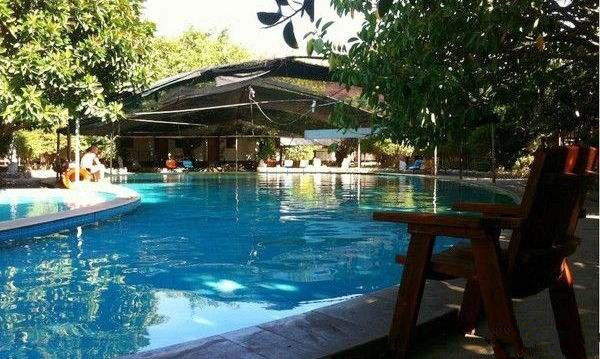
Wenshengjie Village (文盛街村), a natural village, is located in Mizhi Town (密祉镇), Midu County (弥渡县), approximately 1 kilometer from the Yonghe Village Committee (永和村委会) and the town center. Covering an area of 4.26 square kilometers at an elevation of 2,105 meters, the village enjoys an average annual temperature of 17.20°C and receives about 650 mm of precipitation yearly, making it suitable for growing crops like grains. The village has a total of 548 acres of arable land, averaging 0.42 acres per person.
Midu County is celebrated for its “Three Towns, Two Districts, and One Ancient Road,” encompassing the hometown of the “Chinese Lanterns,” a rich cultural heritage, and the famous song “The Little River Flows” (《小河淌水》). The area includes a provincial revolutionary old district and the Wenshengjie Ancient Tea Horse Road (茶马古道), which was designated as a National Key Cultural Heritage Site in March 2013. The village was also listed among the second batch of Traditional Chinese Villages and recognized as a Historical and Cultural Village in China.
During the Tang and Song Dynasties, Wenshengjie was a crucial stop on the Tea Horse Road, with the path traversing the village and featuring a tea-horse station. This ancient road retains much of its historical character, with signs of trade flourishing since the Ming and Qing Dynasties. The village became a significant commercial hub due to its strategic location linking southwest Yunnan. Important historical sites, such as Mizhi Temple (密祉大寺), Kuixing Pavilion (魁星阁), Tuchu Temple (土主庙), Wenchang Palace (文昌宫), and the former residence of Yin Yigong (尹宜公) narrate the village’s rich history.
The ancient road winds along the hills, influencing the village’s layout. Homes are designed with traditional features like “three halls and one wall,” “courtyards,” and “one-cornered yards.” The ancient stone paths are interspersed throughout the village, highlighted by the distinctive hitching stones that extend from Wenming Pavilion (文明阁) in the north to Phoenix Bridge (凤凰桥) in the south.
Located opposite Lantern Square, Mizhi Temple was recognized as a County Cultural Heritage Site in 1992. The temple, grand and solemn, features the Guan Sheng Hall in front and the Jade Emperor Pavilion at the back. Built in the early Qing Dynasty, it has served as a center for education and culture.
Kuixing Pavilion stands at the northern exit of the village, with its entrance adorned with the name plaque “Kuixing Pavilion.” The building features a mud sculpture of the Kuixing deity, known in Chinese culture as the god of exams, signifying scholarly success.
This temple is known for its simple yet elegant entrance and beautiful surroundings. It houses various mud sculptures of Buddhist figures, including the local guardian deity, and historically served as a place for education.
Designed by a master carpenter, this traditional courtyard features intricate carvings depicting historical stories. It honors Confucius and showcases detailed craftsmanship.
Several notable stables, like Nie’s Stable (聂家马店) and Yang’s Osmanthus Shop (杨家桂花店), provided resting places for travelers along the Tea Horse Road, showcasing the importance of trade and transportation.
This two-tier wooden structure served as a cultural hub for theatrical performances and community gatherings.
Reflecting the scholarly tradition of the Shi family, this courtyard emphasizes education and has produced numerous scholars over centuries.
This residence honors Yin Yigong (尹宜公), a prominent figure in collecting and organizing the song “The Little River Flows,” connecting the village’s musical heritage.
Famed for its clear, refreshing water and natural beauty, this spring is located at the southern edge of the village and supports the local food quality.
A renowned ancient bridge rebuilt in 1862, characterized by its exquisite stone craftsmanship.
Originally called “Caishen Pavilion,” it serves as a historic landmark along the ancient road.
Wenshengjie Village can be reached by traveling from Dali City (大理市) via public bus or private vehicle. The nearest major road is accessible, and local transportation options include taxis or shuttle services from nearby towns.
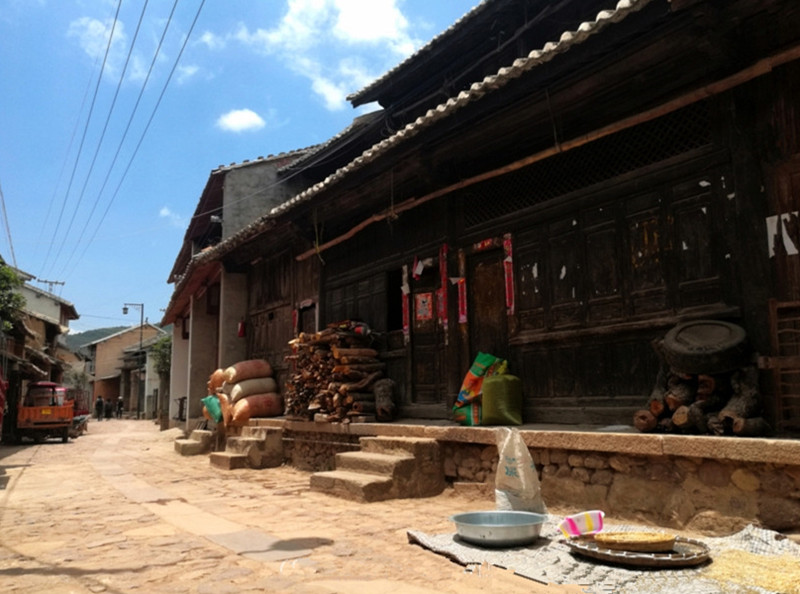
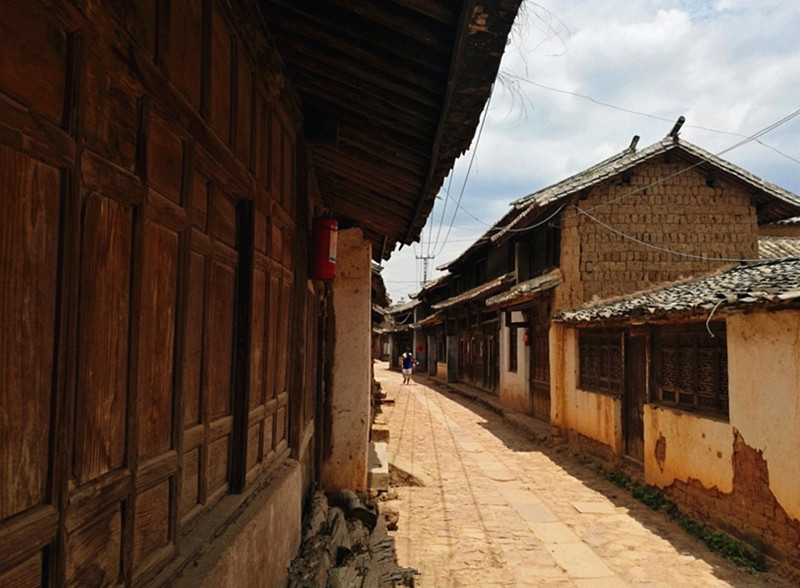
Plan your Dali Ethnic Villages Tour to Dali? Visit Duohu Village in Midu County, Dali which is one of the most fascinating ethnic villages in Dali. Explore the local folk ethnic culture including History, Food and Dining, Clothing, Customs and Traditions, Architecture, Festivals, Crafts, Religion, Language of local ethnic people in Duohu Village in Midu County, Dali.
Chinese Name: 弥渡县多祜村
English Name: Duohu Village in Midu County, Dali
Location:
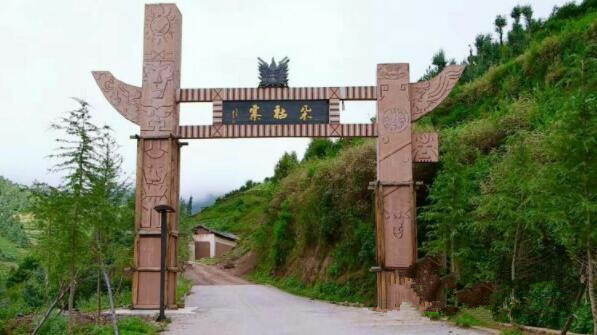
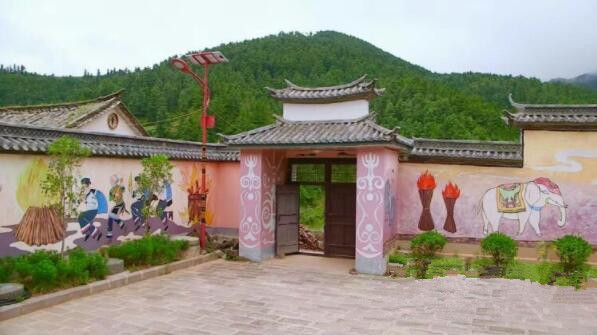
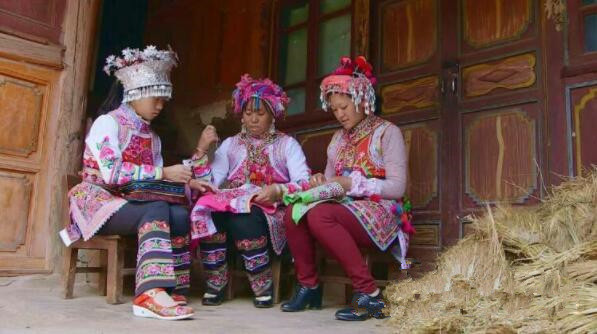
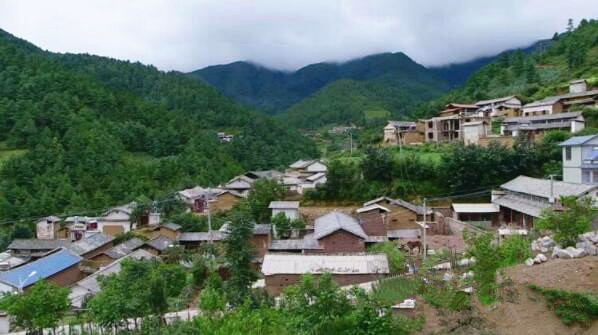
弥渡朵祜彝族村,距镇政府所在地20公里,到镇道路为柏油路,交通方便,距县城30多公里。东邻勤劳,南邻瓦哲,西邻巍山,北邻高坪。辖园林大村、小村、等9村民小组。现有农户 564户。 全村国土面积34.50平方公里,海拔 2200.00 米,年平均气温 15.00℃,年降水量 384.40毫米,适合种植核桃、花椒等。全村耕地面积,2172.00亩,人均耕地1.03亩,林地,30828.00亩。2012年全村经济总收654.00万元,农民人均纯收入1821元。该村属于绝对贫困村,农民收入主要以 种植业为主。
近年来,随着对传统文化的收集、整理、宣传不断加强,中央电视台、云南电视台等对多祜的传统文化给予关注并制作成节目进行播出,《人民日报(海外版)》、《云南日报》等众多报刊也对多祜的传统文化、传承人等进行宣传报道。2005年,多祜被命名为“大理州民族传统文化保护区”。
多祜村历史悠久。多祜村的毕摩(彝族传统文化的继承者和传播者)口头传诵的英雄史诗《黑七腊白》和许多传说故事表明,南诏第一代国王细奴罗曾在多祜游牧,多祜彝族是南诏王室的后裔。从发掘的火葬墓群看出土,早在一千多年前,多祜的农耕生产已达到相当的发达程度。明代朝廷曾在多祜开办过银厂,至今还存有遗址。据村里老人讲,多祜的村子形成于明朝洪武年间。
多祜村的公共建筑及风景名胜有:火葬墓群、清代砖瓦窑遗址、土祖庙、云山公园、睡美人山。多祜服饰和刺绣别具一格。多祜彝族未婚女子头戴鱼尾帽,帽尾系珠串,已婚妇女头戴黑布包头,戴银首饰;衣裤选用绿色布料,袖口镶宽花边,衣罩图案花边领褂;身背圆毡裹背,裹背正中绣黑蜘蛛一对;穿绣花鞋。九十年代初,多祜彝族服饰曾送北京、昆明展览,并载入《中国彝族服饰》。
多祜彝族图腾崇拜主要有:“虎”图腾崇拜、“鹰” 图腾崇拜、“龙”图腾崇拜、祖先崇拜。
2013 年,经多方努力,争取到省民委项目投资825.3万元,实施寅街镇朵祜村“3121工程”示范村建设,建起了民族文化活动场所,民族团结示范村建设不断纵深推进。
多祜得益于得天独厚的自然环境,孕育了上百种珍稀药材。在长期的生活实践中,当地群众整理和总结出一套民间丰富的医药知识及治疗经验,特别是以“接骨神医”——李桐为代表的骨科更是出类拔萃。
https://www.meipian.cn/3vhic93
The Huocang Cemetery Group (火葬墓群) in Duohuo Village (多祜村), Midu County (弥渡县), is a significant archaeological site that showcases the burial practices and cultural heritage of the region. This site provides insights into the local customs, historical development, and social structure of the communities that once thrived here.
The cemetery group consists of multiple cremation burial sites, reflecting the historical preference for cremation among the local population. It is believed that these sites date back to the Ming (明) and Qing (清) dynasties, highlighting the rich historical tapestry of Duohuo Village.
The graves exhibit unique architectural styles, combining traditional Chinese burial customs with local influences. The structures are often adorned with intricate carvings and designs that symbolize various cultural beliefs, providing a window into the spiritual life of the community.
Visitors to the Huocang Cemetery Group can gain a deeper understanding of the local customs surrounding death and mourning. The site also serves as a reminder of the importance of ancestral worship in Chinese culture, where respect for the deceased plays a crucial role in community identity.
To reach the Huocang Cemetery Group in Duohuo Village, travel from Dali City (大理市) via public transport or by car. The journey typically takes about 1.5 to 2 hours.
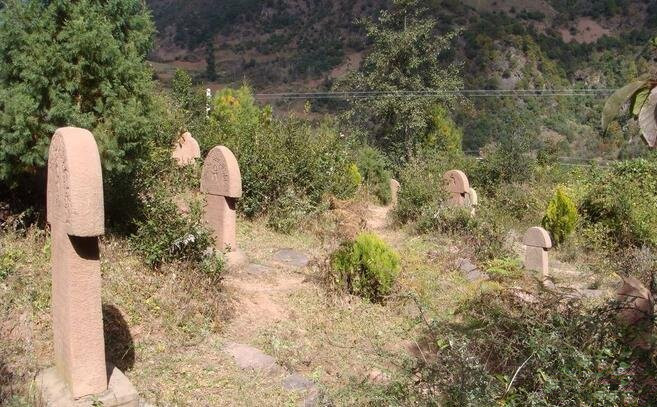
Bianchui Ancient Village (边陲古寨, Biānchuí Gǔzhài) is located 12 kilometers south of Heqing City (鹤庆城, Hèqìng Chéng), 54 kilometers from Lijiang (丽江, Lìjiāng), and 132 kilometers from Dali (大理, Dàlǐ). Covering an area of approximately 50 acres, this unique residential style tourist area stands out along the Dali-Lijiang tourism route.
The village is characterized by its distinctive architecture and unusual scenery. While there are winding paths, they do not lead to secluded areas, and the landscape, though scenic, is not conventionally charming. The village is home to a group of border people who seem almost forgotten by the outside world. Historically, these border people lived along the China-Myanmar border without an identifiable ethnic group, leading a primitive lifestyle where they covered themselves with leaves, ate raw food, and lived in trees.
To address their living conditions, Yunnan’s relevant authorities constructed this mountain village—Bianchui Ancient Village—and invited some young border residents to collaboratively develop a new tourism project aimed at improving their livelihoods.
The border people do not understand the local language and have no written characters. To show friendliness, visitors should say “亚哈亚哈” (Yàhā Yàhā), and to ask for photos, say “咔嚓咔嚓” (Kāchā Kāchā). The village features several rows of thatched houses resembling shacks found in melon fields. While the layout may not be intricate, it is orderly and clean.
Hanging from the roofs are the skulls of unknown animals, and in front of the houses are tools for hunting and defense against wild beasts. Bird nets made of twine are scattered on the ground and trees, indicating their use in trapping birds.
Today, the border residents wear clothing—men typically wear black pants, while women dress in bikini-like attire, occasionally donning long shirts. They have dark skin and robust bodies, and both men and women go barefoot.
The scenic area is divided into five sections:
The peculiar ways of life of these extraordinary border residents will provide visitors with unexpected insights. During the tour, residents might appear suddenly, shout unexpectedly, or leap from trees, all designed to surprise and astonish visitors.
To reach Bianchui Ancient Village:
Bianchui Ancient Village offers a fascinating glimpse into a unique culture, making it an unforgettable destination for adventurous travelers seeking to explore the lesser-known aspects of Yunnan.
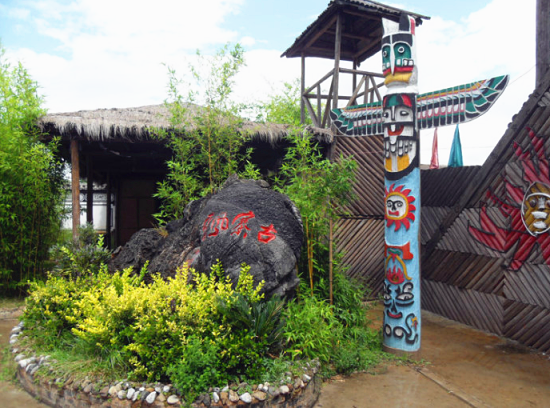
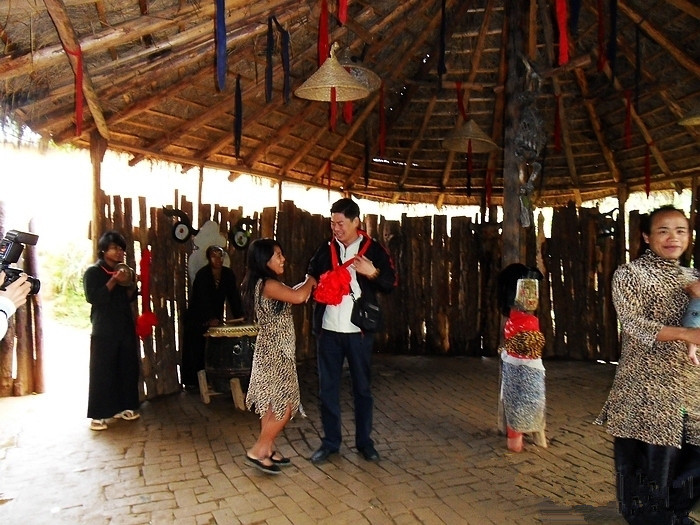
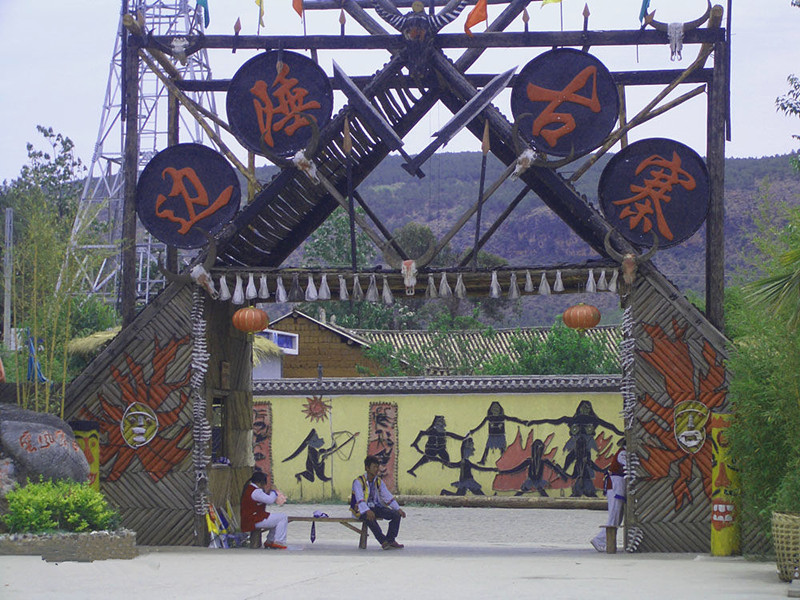
Taoyuan Village (桃源村, Táoyuán cūn) is located in Xizhou Town (喜洲镇, Xǐzhōu zhèn), approximately 7 kilometers north of the town government and 40 kilometers from Dali City (大理市, Dàlǐ shì). The village has convenient transportation, with asphalt roads connecting it to nearby areas. The primary sources of income for local farmers come from the commercial beverage industry and construction.
Taoyuan Village lies adjacent to Erhai Lake (洱海, Érhǎi) on the east, Zhoucheng (周城, Zhōuchéng) to the south, Cangshan Mountain (苍山, Cāngshān) to the west, and Shangguan Village Committee (上关村委会, Shàngguān cūn wěiyuánhuì) to the north. It comprises 9 villager groups and, as of 2006, had 632 households and a population of 2,658, all engaged in agriculture. The labor force totals 1,443, with 443 individuals working in the primary industry.
Taoyuan Village, situated beside Erhai Lake, boasts stunning scenery. It has several lakeside guesthouses, such as “Linhai Muyu” (临海沐月, Lín hǎi mùyuè) and “Taoyuan Family” (桃源人家, Táoyuán rénjiā). These guesthouses often have designs that integrate with the water, offering beautiful views of Cangshan Mountain and Erhai Lake, making them ideal spots for sunrise watching. One notable hotel is the Athena Oriental Boutique Hotel (大理雅典娜东方精品酒店, Dàlǐ Yǎdiǎnnà dōngfāng jīngpǐn jiǔdiàn), where the friendly owner once invited us to visit when we couldn’t enter another guesthouse.
Taoyuan Village has not been fully developed, maintaining its tranquil charm, much like its name suggests—a “paradise on earth” (世外桃源, shìwài táoyuán). In November 2021, Taoyuan Village was included in the public recommendation list for Yunnan Province’s 2021 Beautiful Villages, and in December, it received the honor of being named a “Beautiful Village” in Yunnan Province.
As a Bai ethnic (白族, Bái zú) village, the architectural style features traditional Bai designs, including the “three halls and a screen wall” (三坊一照壁, sān fáng yī zhàobì). The Bai people primarily engage in rice farming, representing a typical agricultural community. The village’s layout and decorative elements reflect both Han Chinese influence and distinct Bai characteristics, with white walls, ornate doorways, and artistic decorations showcasing flowers, birds, and landscapes.
Taoyuan Village enjoys a low-latitude plateau monsoon climate, making it suitable for visits throughout the year. The best times to explore are in spring (March to May) and autumn (September to November), when the weather is pleasant, and the scenery is particularly enchanting.
3-4 hours
Common languages spoken include Southwestern Mandarin (西南官话, xī nán guānhuà), Bai language (白语, bái yǔ), Yi language (彝语, yí yǔ), and Mandarin Chinese (普通话, pǔtōnghuà).
To reach Taoyuan Village, you can choose from various modes of transport:
By planning accordingly, you can enjoy a memorable trip to Taoyuan Village, experiencing the blend of natural beauty, rich history, and vibrant ethnic culture.
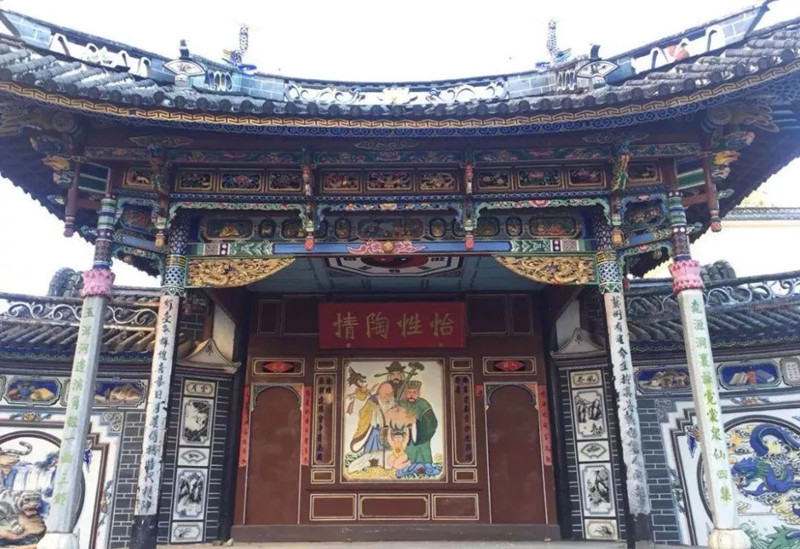
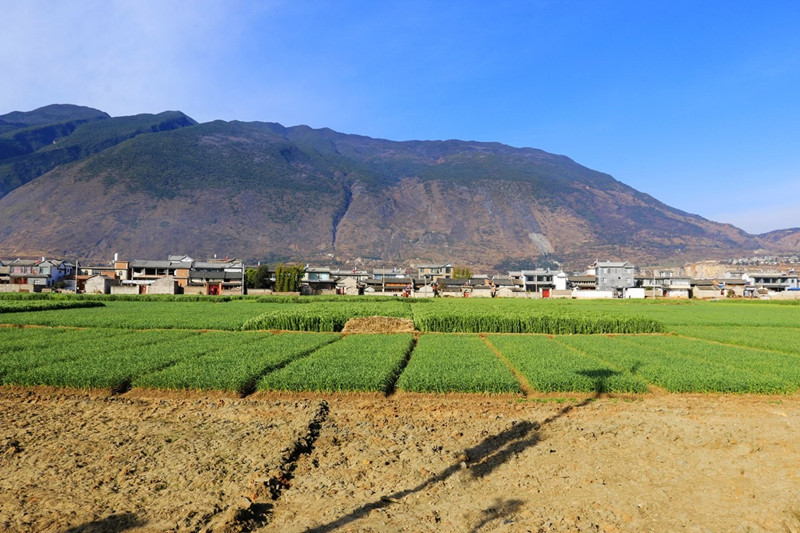
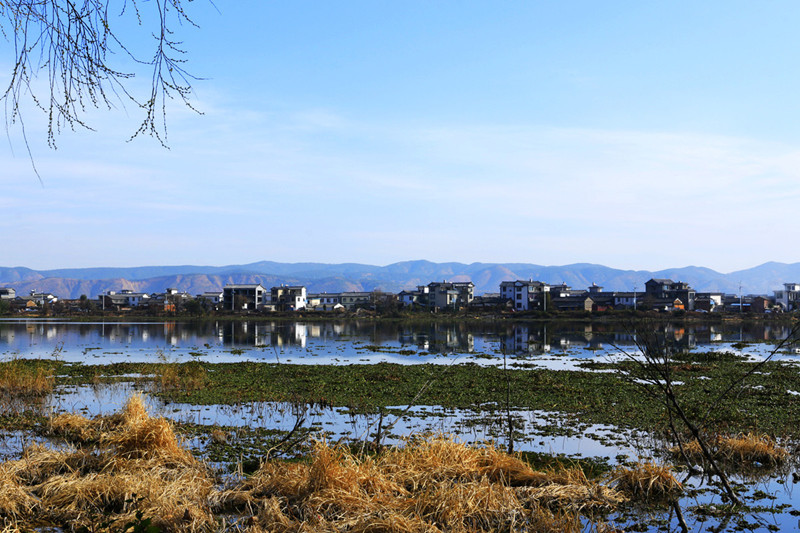
The Longkan Wharf (龙龛码头) at Erhai Lake (洱海) is located in Dali City (大理市), Yunnan Province (云南省), specifically in the Xiaguan District (下关区). This scenic spot, situated near the banks of the Mang River (芒市河), extends approximately 204 meters. Each structure at the wharf is supported by four concrete piles, featuring designs reminiscent of a dragon raising its head and a crane holding its head high.
The wharf is located in the western part of Erhai Lake and serves as an open attraction that boasts an ancient ferry port, seagulls, and the best sunrise viewing points, making it an ideal place for photography and enjoying beautiful landscapes. Just a few hundred meters to the south lies a picturesque water fir forest (水杉林).
Longkan Village (龙龛村) is one of the closest villages to Dali Ancient City (大理古城), typical of the Bai ethnic group (白族) and situated about three kilometers east of the ancient city. Historically, Longkan Wharf was named after Wang Shilong (王蒙世隆), the eleventh king during the Nanzhao Kingdom (南诏), who lived here for eight years. To express gratitude to the local residents for their hospitality, he named the nearby village “Longkan,” meaning “the place where dragons once lived.”
From the sixteenth day of the first lunar month to the twenty-fifth day of the second lunar month, a pilgrimage festival takes place where worshippers gather at Haiyan Temple (海晏庵) and take boats from the ancient ferry to Guanyin Pavilion (观音阁) on Jizushan Mountain (鸡足山).
Dali Longkan Wharf was also a filming location for the movie “Breakup Buddies” (心花路放) directed by Ning Hao (宁浩). The movie highlights the area’s charm, making it a spiritual refuge for those seeking solace from life’s struggles.
If you’re a fan of the film, you may want to explore the fictional Wutong Inn (梧桐客栈) portrayed in the movie, although it does not actually exist. The area has seen changes since 2006 and is currently undergoing renovations, which sometimes results in temporary closures.
Longkan Village has a pleasant environment with clear waters from Erhai Lake and nearby wetlands, evidenced by the water birds that gather here. Although seasonal variations may affect birdwatching, this peaceful village offers a quiet retreat.
The village’s roads are well-maintained, making cycling along the lakeside an excellent choice. However, vehicles are not allowed within the village, so bicycles are the preferred mode of transport. Shared bicycles can be scarce, but the tranquil atmosphere and stunning scenery make the effort worthwhile.
You can drive or take a taxi to Heku Inn (鹤居客栈). Be aware that vehicles cannot enter the alleyways, and the entrance near the stone archway can get congested.
To capture stunning photographs, arrive by 6:40 AM. Position yourself slightly left of the water fir forest for fewer crowds and beautiful views. Wear light colors and bring a small flower basket and a wide-brimmed hat to enhance your photos.
For more details, including visitor reviews and tips, check travel forums and social media platforms where travelers share their experiences. Enjoy your visit to Longkan Wharf and embrace the natural beauty and cultural richness of Dali!
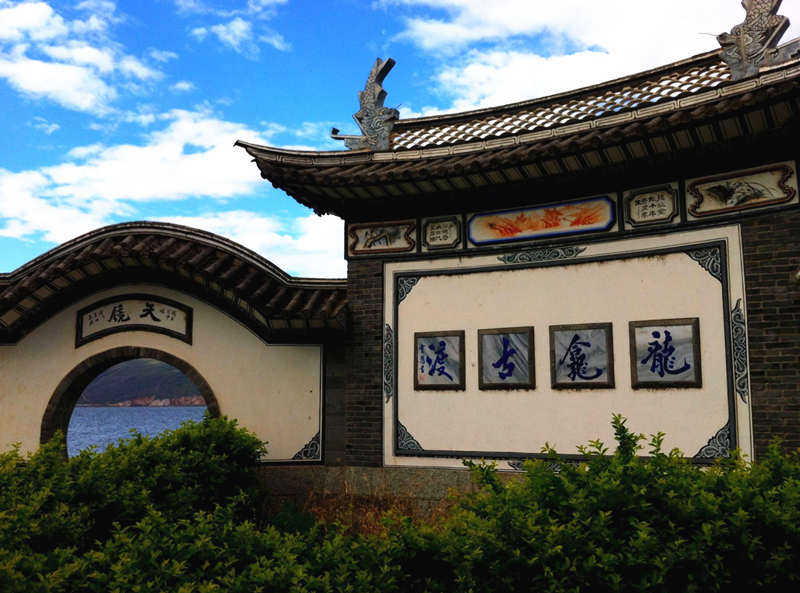

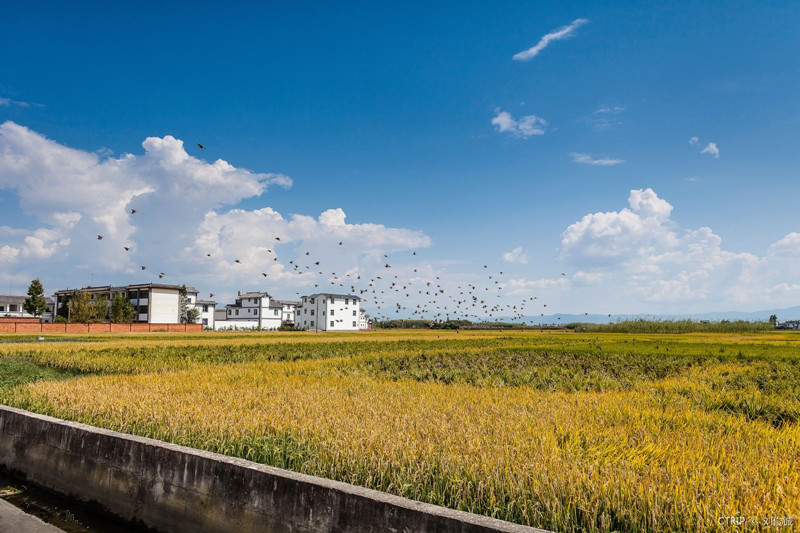
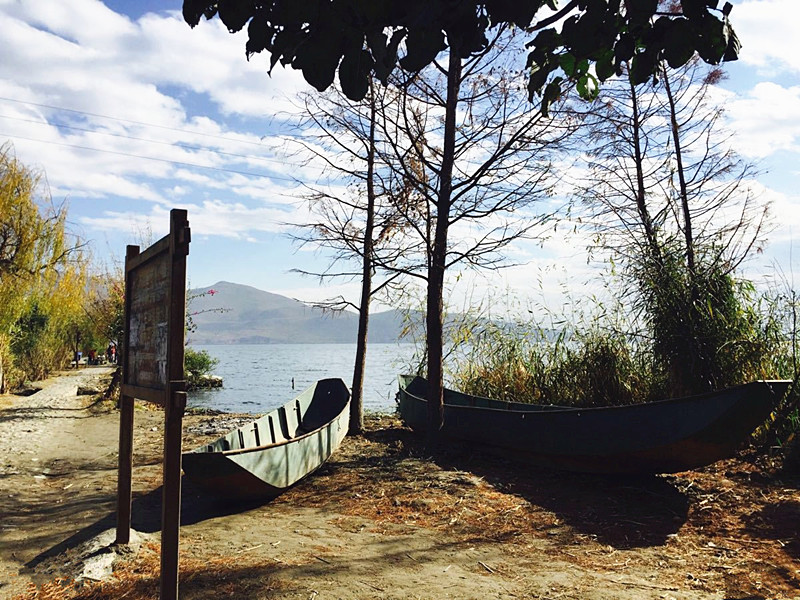
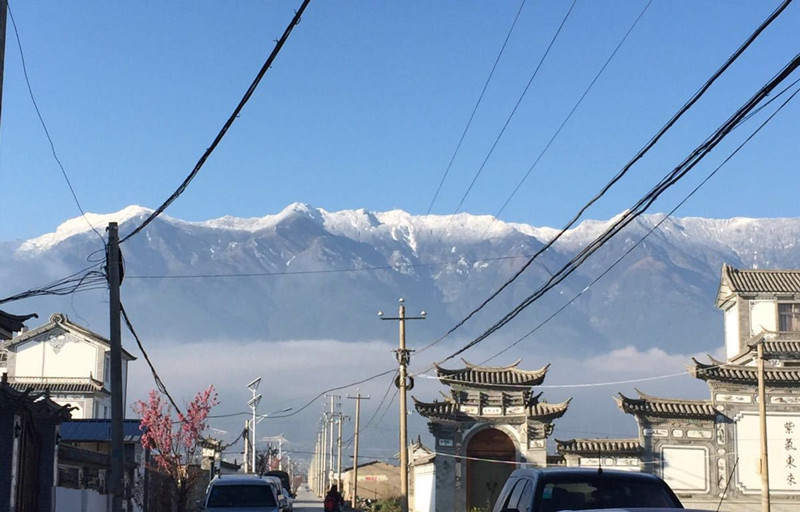
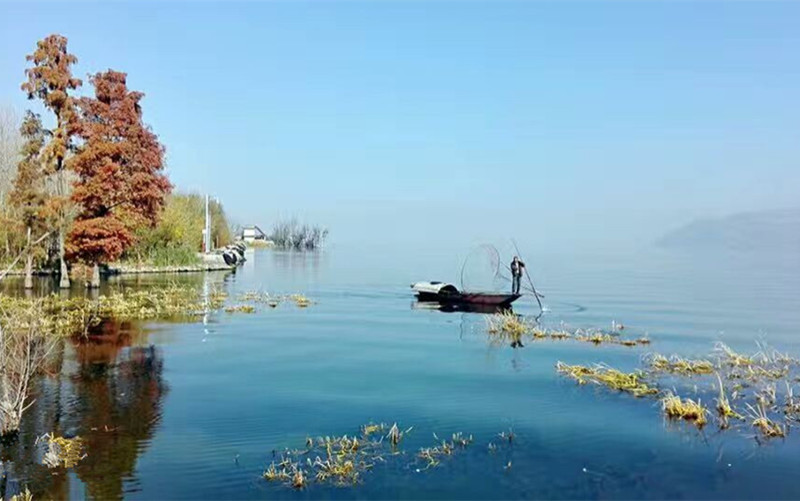








Ancient Villages in Yunnan
Baiyi Village (摆依村) is located in Jiagu Village Committee (贾姑村委会), Shijie Yi Ethnic Township (十街彝族乡), Yimen County (易门县), Yuxi City (玉溪市), Yunnan Province (云南省). It is 32 kilometers from...
Pingtanzi Village (平滩子村) is located in Zhongtun Community (中屯社区), Longquan Subdistrict (龙泉街道), Yimen County (易门县), Yuxi City (玉溪市), Yunnan Province (云南省). It is situated 32 kilometers from the county...
Basic Introduction Chinese Name: 海灯会 English Name: Haidenghui Festival Date: 15th July each year(Lunar Calendar) Haideng Festival is the biggest tradition prevailing in Qingsuo Village, Dali Prefecture, Yunnan. It’s names as “Haideng”...
Lashi Lake (拉市海), located in Yulong Naxi Autonomous County (丽江市玉龙纳西族自治县), is a picturesque alpine wetland surrounded by several villages boasting unique cultural and natural landscapes. Here are some noteworthy...
Mapingguan Village Mapingguan (马坪关)(literally “Horse Pasture Pass”) is located about 15km southwest of Shaxi Valley at the site of a covered bridge, on the road to three major western...
Introduction Nestled in Yunnan Province’s Dali Bai Autonomous Prefecture, Xiashankou Hot Spring (下山口温泉) is a magical area known for Putuo Spring (普陀泉). Legend has it that this spring is...
Overview Wenshengjie Village (文盛街村), a natural village, is located in Mizhi Town (密祉镇), Midu County (弥渡县), approximately 1 kilometer from the Yonghe Village Committee (永和村委会) and the town center....
Plan your Dali Ethnic Villages Tour to Dali? Visit Duohu Village in Midu County, Dali which is one of the most fascinating ethnic villages in Dali. Explore the local...
Overview The Huocang Cemetery Group (火葬墓群) in Duohuo Village (多祜村), Midu County (弥渡县), is a significant archaeological site that showcases the burial practices and cultural heritage of the region....
Overview Bianchui Ancient Village (边陲古寨, Biānchuí Gǔzhài) is located 12 kilometers south of Heqing City (鹤庆城, Hèqìng Chéng), 54 kilometers from Lijiang (丽江, Lìjiāng), and 132 kilometers from Dali...
Overview Taoyuan Village (桃源村, Táoyuán cūn) is located in Xizhou Town (喜洲镇, Xǐzhōu zhèn), approximately 7 kilometers north of the town government and 40 kilometers from Dali City (大理市,...
Overview The Longkan Wharf (龙龛码头) at Erhai Lake (洱海) is located in Dali City (大理市), Yunnan Province (云南省), specifically in the Xiaguan District (下关区). This scenic spot, situated near...
Don't assume you're restricted to the main hubs of Beijing and Shanghai, our tours can start from any city.
For your safety, please register with the Embassy.
Exchange some local currency for your trip
Start planning your tailor-made holiday to China by contacting one of our specialists. Once enquired, you’ll get a response within 0.5~23.5 hours.

Address: Building 4, Yifuyuan, Hehong Road, Xishan District, Kunming, Yunnan, China
Wechat/QQ: 270384698
Office Call: 86-18812220370
Email: Trip@YasoTrip.com
Facebook Page:
https://www.facebook.com/YasoTrip
Tel/WhatsApp: +8618088243690
Trip@YasoTrip.com
Daily: 9:00 am - 6:00 pm
Copyright © 2008 Yaso Trip. All rights reserved
Address: Building 4, Yifuyuan, Hehong Road, Xishan District, Kunming, Yunnan, China
Wechat/QQ: 270384698
Office Call: 86-18812220370
Email: Trip@YasoTrip.com
Facebook Page:
https://www.facebook.com/YasoTrip
Tel/WhatsApp: +8618088243690
Trip@YasoTrip.com
